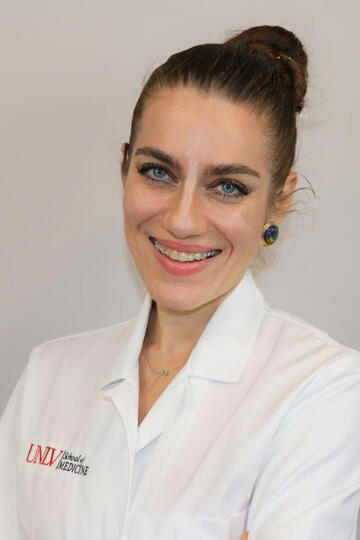Dr. Ana Mrkaic, an endocrinologist with UNLV Medicine, remembers that as a little girl she always questioned the existence of things around her.
She just had to find out, for example, why she would hear thunder, how the snowflakes that fell on her in her native Serbia formed. “The origin of different matters attracted me,” Mrkaic said. “I am still driven by it, exploring the endocrine world.”

Today, she is a physician who treats the problems, diseases, and medical conditions of the endocrine system, an intricate network of glands producing hormones that regulate various functions in the body. The majority of her patients have pancreatic endocrine disease, better known as diabetes.
Mrkaic said she always digs deeper to find the origin of a patient’s problem rather than relying on the “obvious clinical picture.”
Her father was an OB/GYN specialist, and her mother, a pediatrician-neonatologist. She says she learned from her parents that “the first important thing was to think through both clinical and biochemical data, and then put the puzzle together. They were both excellent in making the appropriate diagnosis.”
It wasn’t a foregone conclusion that Mrkaic would follow her parents into the practice of medicine.
Change of Course
“Almost until the end of my high school, I was so fascinated with literature and art that I thought I would probably become a writer. My parents never expected me to follow their careers. They used to leave all decisions regarding our lives to my brother and me. In my last year of high school, I realized that the thing which attracts me to literature is people, which literature and art are about. I realized that I would not be able to live life distant from them and that I would love to become a figure that they can rely on, as my parents have always been.”
Mrkaic received her medical degree from the University of Nis in Serbia, where she also received a doctorate in molecular biology. Her doctoral thesis was on the impact of gestational diabetes on fetal heart remodeling — how the heart changed its structure and shape because of diabetes. Because she realized so many medical innovations, new scientific findings and new treatment approaches occurred in the United States, Mrkaic said she decided to do her more involved medical training in the U.S.
She completed a residency in internal medicine at Mountain View Hospital in Las Vegas and a fellowship in endocrinology at the University of Arizona. She says her work with her medical school professor, Dr. Borislav Kamenov, a well-known immunologist in Serbia, helped her make the decision to do a fellowship in endocrinology.
The endocrine system, with its network of gland-producing hormones, is one of the body’s instruments that help regulate and modulate its immune system, working with the nervous system and immune system to help the body cope with different stresses. A number of endocrine diseases (including types of thyroid, parathyroid, pituitary and adrenal disease) are quite rare. A much more common endocrine disorder is diabetes. More than 30 million Americans, nearly 10 percent of the U.S. population, have diabetes.
The more Mrkaic works with patients who have diabetes, which takes up much of her professional time, the more she says she believes in educating patients.
“Diabetes is a very complex problem, not just from the biological point of view, but from the psychological point of view as well,” said Mrkaic, who also serves as an assistant professor in the department of internal medicine at the Kirk Kerkorian School of Medicine at UNLV. “It takes an effort for patients to understand how to change the lifestyle they’re living and much more courage and strength to start living by the recommended, healthier lifestyle regimen. I think, as the first step, there must be an important conversation with patients, where you build up a relationship of trust and love. We are the team, physicians and patients, in this battle against diabetes. We should spend more time explaining and teaching.”
COVID-19 has affected her medical practice, but Mrkaic hasn’t let it get in the way of helping patients.
“COVID-19 started during my fellowship, so I have been doing a lot of telemedicine. Care of patients has been run by accepting new rules we have to live and work by. There’s not much left except for embracing those new rules. It is life, after all. It has its own flows and currents. We should just follow them. Like everything else, it will be gone one day. We should do our best during these difficult times to protect ourselves and others and make the best of it.”



